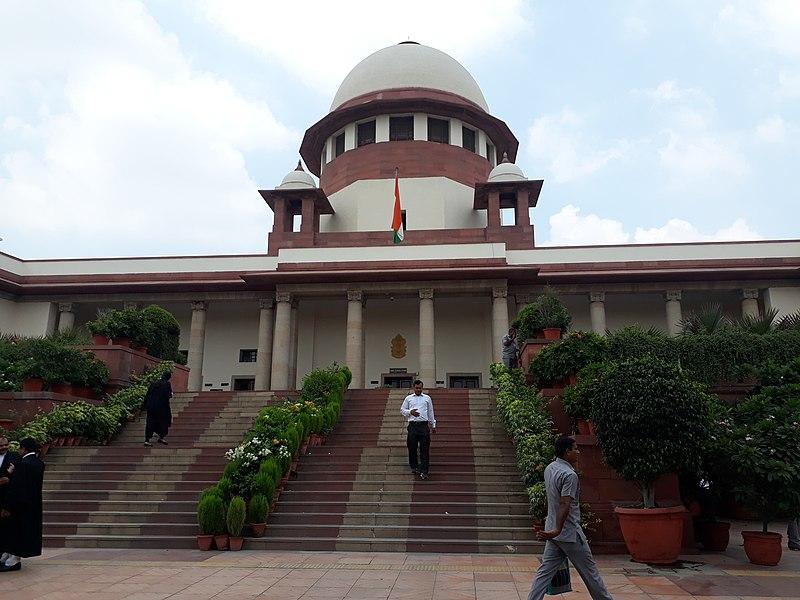Supreme Court Issues Notice to Govt. on Petition Against Bribery in Elections

The Supreme Court of India has issued notice to the Union Government yesterday based on a writ petition filed by the secretary of the Andhra Pradesh unit of the Communist Party of India (CPI), Kaka Rama Krishna, concerning election expenditures. The Bench hearing the petition consists of the Chief Justice of India Ranjan Gogoi, Justice KM Joseph and Justice Hemant Gupta. The petition has highlighted that the Election Commission of India has repeatedly proposed that the government pass a law to make electoral bribery a cognisable offence since 1992. In this regard, the petitioner has prayed for the Supreme Court to direct the Union of India to implement the same – at least through an ordinance – for the upcoming assembly and Lok Sabha Elections. The main thrust of the petition was in highlighting how money power during elections vitiates democracy.
Also Read | BJP’s Election Strategy: Data is the New Opium
Under the Indian Penal Code, 1860 (IPC), bribery is defined under section 171B as accepting gratification for exercising one’s right. In the context of election, this means that one accepts gratification – money, liquor, gifts – to exercise the right to vote. The punishment for this offence is laid down under section 171E of the IPC as a fine, imprisonment for one year or both. However, bribery by ‘treating’ – where gratification is in the form of food, drink or entertainment – is punishable only by a fine.
On the face of it, it appears that the offence of bribery is adequately taken care of by the existing law. However, under the First Schedule of the Code of Criminal Procedure, 1973 (CrPC), the offence is listed as a bailable non-cognisable offence. This becomes an issue as even investigating a non-cognisable offence requires the investigating officer to obtain permission from a Magistrate. Since bribery as an electoral offence can be heard by a Judicial Magistrate First Class (JMFC), the permission will have to be obtained from the same. By the time the investigation is complete, and the chargesheet filed, the concerned election would presumably have been concluded. Making the offence cognisable, on the other hand, would allow the police to commence investigations the moment the complaint is received.
A 2014 report by the Center for Media Service (CMS) highlighted how the phenomenon of note-for-vote resulted in citizens having to pay several times the amount they received as bribes for availing public services. The same study also showed that bribes paid during elections were increasingly being routed through middlemen, and that even when cash consignments were caught, it was impossible to name the candidate responsible.
Also Read | Pseudo-Transparency Through the Electoral Bond Scheme
However, the issue concerning expenditure during elections are not limited to bribery. An ongoing and rather understated tussle continues regarding the introduction of Electoral Bonds as a mode of financing election campaigns and political parties. The Election Bond Scheme (EBS) was touted by Union Finance Minister Arun Jaitley as the panacea for all of the problems associated with untaxed money entering the coffers of political parties. However, file notings have shown that the proposal was opposed by some members within the Election Commission of India.
The problem with Electoral Bonds is due to the amendments made to existing laws. For example, information regarding the buyer of the bond will not be disclosed. Further, political parties would technically be in the dark concerning who has bought the bonds. However, Jaitley’s claim that the scheme is transparent since the Know Your Customer (KYC) norms would have to be fulfilled before one can buy a bond indicates the extent of the transparency. Since only the State Bank of India (SBI) is authorised to issue Electoral Bonds, and since SBI is a public sector bank, it would not be impossible for the records to be accessible by the government.
This scenario raises plenty of issues. Firstly, the privacy aspect of the EBS does not allow the public to know who is donating to which party – whether a corporate or individual donation. Secondly, funds received through the EBS need not be declared by political parties. Thirdly, the provisions regulating under what circumstances and how much can be contributed to a political party by companies has been lifted, which implies that shell companies can be set up solely for funding political parties. Fourth, due to the KYC norms, only the public sector SBI has access to the bond buyers and in whose favour the bonds were bought, hence, the government in power can accordingly punish the corporates that donate to the opposition.
In essence, the petition does strike at the grass roots manifestation of dirty politics, however, the core issue persists with regard to the source of the money.
Get the latest reports & analysis with people's perspective on Protests, movements & deep analytical videos, discussions of the current affairs in your Telegram app. Subscribe to NewsClick's Telegram channel & get Real-Time updates on stories, as they get published on our website.
























